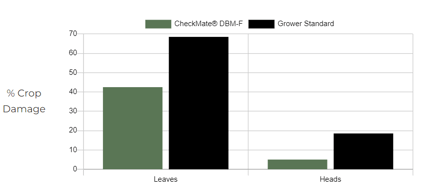


The early bird gets the worm - this idiom is more applicable than ever when it comes to diamondback moth. Are you familiar with the benefits of starting early with mating disruption applications for your cole crops?
California cole crop growers and PCAs are very familiar with diamondback moth and the damage it can cause. The larvae of this Lepidopteran pest are voracious feeders on cole crops, causing damage to the leafy part of the plant that can result in downgrades or rejects at the packinghouse.
Diamondback moth can begin damaging cole crops such as brussels sprouts as early as the greenhouse, often preferring to feed on the inner, tender part of the plant rather than the outer leaves. In crops like broccoli, cabbage, and cauliflower, early feeding can disrupt head development. Even in crops that do not show significant damage, diamondback moth larvae can result in otherwise healthy-seeming crops being discarded.
Diamondback moth is a challenging pest to control. However, pest pressure and damage can be mitigated with early implementation of an effective integrated pest management strategy.
Suterra’s DBM-F Flowable works by preventing male diamondback moths from finding females, therefore inhibiting reproduction, and reducing the size of each subsequent generation. Implementing mating disruption from the beginning (before or right at transplanting) will reduce DBM populations early in the season, making each future generation smaller and more manageable. Continued mating disruption throughout the season will further drive populations down and result in significantly less crop damage at harvest.
Mating disruption provides long-lasting protection from diamondback moth for up to 30 days after application. Once applied, you will immediately notice lower moth catches in pheromone traps, an indicator that the pheromone is effectively inhibiting the male’s ability to locate females for mating. Effective sprayable mating disruption programs may vary by individual growers and PCAs, with many choosing to begin applications early to maximize the results.

Damage Reduction: The addition of CheckMate® DBM-F into a comprehensive IPM program reduces Diamondback moth damage.
Anywhere diamondback moths are present, the sprayable formulation will be effective. The microencapsulated technology allows each droplet of Flowable to act as a ‘mini dispenser,’ dispersing pheromone consistently over time to inhibit reproduction. Sprayable pheromone should be reapplied after significant rain.
Earlier is better when using DBM-F in your integrated pest management program. DBM-F is tank-mixable with the most common agrochemicals, allowing you to save on money, time, and labor by adding mating disruption to the existing spray program. DBM-F is flexible and when used consistently throughout the season
For more information about DBM-F sprayable mating disruption, reference our deployment guide or contact us here.